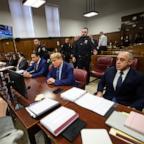Gingrich Says Biggest Worry About Trump Officials Is That They Might 'Lose Their Nerve'
Newt Gingrich and Donna Brazile look ahead to 2017 and back to the election.
— -- Less than three weeks before the presidential inauguration, leading Trump ally Newt Gingrich said his biggest worry about the incoming administration is that its members will "lose their nerve."
"Look, they're going to arrive in Washington, and for them to be successful, they have to stake out positions that [Democratic National Committee interim Chairwoman Donna Brazile] will not like and the left will hate," Gingrich, a former speaker of the House, said in an interview with Brazile by ABC News' chief White House correspondent, Jonathan Karl. "I'm worried that when they realize how big the problem is, that they decide that they're just going to do the best they can and give in."
"My deepest concern is that they're going to arrive, you're going to have the greens going crazy" over the Environmental Protection Agency and the Department of the Interior, Gingrich said. "You're going to have the government employees going crazy about civil service reform. You're going to have the teachers' union going crazy over school choice. And these are pretty nonnegotiable. I mean, if you're serious about school choice, there is no agreement with the teachers' union."
Gingrich and Brazile sat down with Karl for a taped interview that aired today on "This Week" to look ahead to the new administration and back on Donald Trump's rise from businessman and reality TV star to president-elect.
"2016 will go down as the year where the rules were changed," Brazile said of Trump's winning states — such as Wisconsin, Pennsylvania and Michigan — that usually go Democratic in presidential races.
"[Trump] ran a nontraditional campaign. I give him credit for that," Brazile said. "That said, you have to give credit to the campaign that had a consistent message 100 percent of the time — 'Make America great' ... a slogan that became the message that became the song. And you got a song, you got a melody."
"Donald Trump broke the blue wall. He cracked it, and then he broke it wide open, and then he siphoned off enough votes from disenchanted Democrats, independents and others that allowed him to win the electoral vote," Brazile said.
Trump won 304 electoral votes, compared with 227 for Democratic presidential nominee Hillary Clinton. In the popular vote, the final tally showed Clinton with nearly 2.9 million more votes than Trump, according to The Associated Press.
Gingrich said it's not a concern that Trump lost the popular vote, because the race is determined by electoral votes.
"The rules of the game as they were played meant that Donald Trump was president. When you're president, you're president. You have the mandate of being the president," Gingrich said.
"Whether he uses that mandate to unify the country and bring us together, which he should, is not a function of the size of the popular vote," Gingrich said. "It is a function of, 'What does a good president do?' A good president tries to represent all of America."
Brazile said she thinks Trump has an "enormous opportunity" to reach across the political divide after he takes office Jan. 20.
"He has an enormous opportunity, as every president in the first 100 days does, to show that he is eager to find common ground, to meet with Democrats," Brazile said.
As an example, she pointed to incoming Senate Minority Leader Chuck Schumer.
"I mean, Chuck Schumer knows Donald Trump — both New Yorkers. Have him over for breakfast, have him over for afternoon tea and see if you can find common ground."
Gingrich and Brazile, who are longtime friends, reflected on how the country can heal after one of the most divisive elections in recent history.
"You know, it's a wait-and-see game," Brazile said. "There is so much that we can do together if we can find common ground."
Gingrich said, "My faith in Trump is I think he has the guts as well as the energy to have those kinds of meetings and to reach out to a broader range than maybe anybody since [Franklin Roosevelt]."




